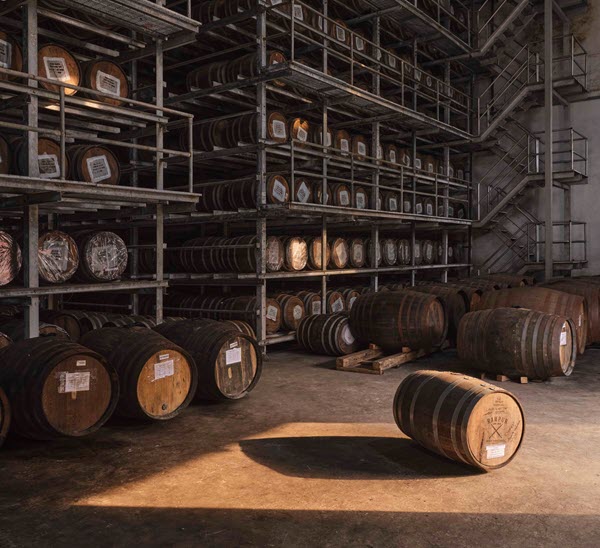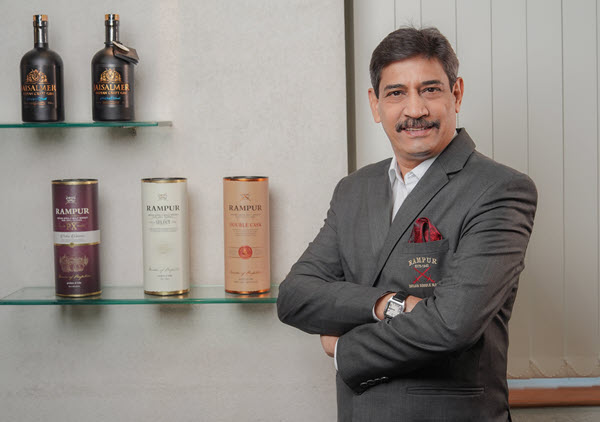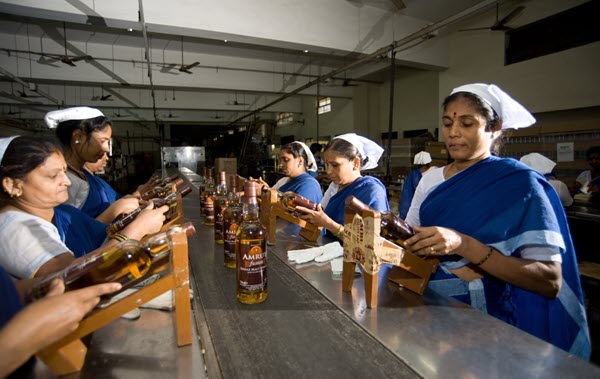A Postcard from India
The slow dance to sign a trade deal with India and drop the tariffs on imported spirits never ends, but in the meantime, Scotch is doing fantastically well in what is now its biggest market, as Tom Bruce-Gardyne reports…
Last year India sailed past France to become Scotch whisky's number one market by volume. Shipments surged 60% to the equivalent of 18.2 million cases, though only a quarter was actually bottled in Scotland.
The rest was shipped in bulk which mostly disappears into Indian whiskies while some is bottled locally for blends like Teachers, Vat 69 and 100 Pipers. By value, India is now no.5 in the export charts, up from 8 in 2021, having almost doubled last year to £281m. All this, despite the crippling 150% import tax levied on every drop since 2007.

The battle to lower those tariffs and sign a Free Trade agreement with India has ground on for years. Boris Johnson declared it would be done and dusted by Diwali last October, but he himself was done and dusted in the meantime along with his successor, Liz Truss. With the ninth round of talks due to start, will Rishi Sunak have more luck?
"Your guess is as good as mine," says Sanjeev Banga, president of international business at Radico Khaitan, one of the oldest and largest Indian whisky producers. "But I think there is a certain urgency from both sides and my sense is it could happen in the next couple of months."
It is clearly a priority for a Tory government in urgent need of some good news – something the Indian negotiators won't have missed.
For all its importance to the Scotch industry, the drink is reckoned to account for just 2% of all whisky drunk in India. Martin Bell, deputy director for trade at the Scotch Whisky Association (SWA), suggested to WhiskyInvestDirect that volumes might treble if tariffs are slashed.
Rakshit Jagdale, MD of Amrut Distilleries, home to one of India's top single malts, disagrees, saying: "I think it will be much more. The desire for consuming Scotch is always there. It's very high in India and we can expect a big impact."
"Take a market like Bangalore where Blender's Pride sells for 1,900 rupees, which is about £19," he says, of one of Pernod Ricard's key Indian whiskies. "Johnnie Walker Red Label is about £26-28, so at the moment there is quite a difference." If the tariffs tumble, he reckons Red Label could drop to as low as £22, prompting consumers to switch.
But Sanjeev Banga is not convinced. Having worked for Pernod and before that Seagram's who created the brand, he says: "Blender's Pride is superior to a lot of Scotch." For him, premium Indian whiskies have improved beyond measure, being made entirely from grain, albeit largely unaged, and no longer from sugar cane molasses.
"The Indian consumer today is very well-aware, and the liquid plays a very significant role," he says. "Just because it's a Scotch doesn't mean the consumer will readily accept that."

If tariffs drop to maybe 100% initially, it will benefit producers like Radico Khaitan in terms of the bulk Scotch used in its 8PM blend, the country's sixth most popular whisky with sales of 11.4m cases in 2021. But if demand for Scotch trebles, distillers in Scotland might be less inclined to sell in bulk given its low margins. The industry earnt the equivalent of just £1.28 a bottle from India compared to £8.24 from the US last year.
Sanjeev suspects Pernod will continue with its Indian whiskies, and says: "These brands are doing huge volumes and are highly profitable." In 2021, Blenders Pride together with stablemates Royal Stag and Imperial Blue sold over 54m cases. That's a lot of whisky.
As for Diageo with its more recent involvement dating from 2014 when it gained control of United Spirits, he feels: "They will be more susceptible to focus on their mainstream Scotch brands than IMFL (Indian-made foreign liquor)."
Like many Indian distillers, he questions the ethics of a Scotch industry happy to sell Indian brands as 'whisky' in India and even export them, though not to the West where they are not allowed to be called 'whisky'. "Why is Scotch whisky so afraid of Indian whiskies if they are so confident of the quality of their product?" he asks. "Why not let the consumer decide?" All good questions for the SWA.

If the Indian government does pull down its protectionist tariff wall, and individual States like Maharashtra stop favouring imports by charging half the duty they levy on home-grown spirits, it should level the playing field, at which point Indian consumers will decide.
Those who have stretched to buy Johnnie Walker Red in the past, for example, might think twice if its price and prestige drop. Sanjeev Banga pictures some of his compatriots picking up a bottle and saying: "This is for the masses! I'm not drinking that."
Who knows, but for now Scotch is doing pretty well in India notwithstanding the tariffs. The Indian love of whisky in all its forms appears undimmed and in little danger from the authorities despite the desire for Prohibition being enshrined in the Indian constitution. Some politicians still bang that drum at election time, but in truth most individual States are completely hooked on the demon drink, or at least the revenue it brings.

Award-winning drinks columnist and author Tom Bruce-Gardyne began his career in the wine trade, managing exports for a major Sicilian producer. Now freelance for 20 years, Tom has been a weekly columnist for The Herald and his books include The Scotch Whisky Book and most recently Scotch Whisky Treasures.
You can read more comment and analysis on the Scotch whisky industry by clicking on Whisky News.




